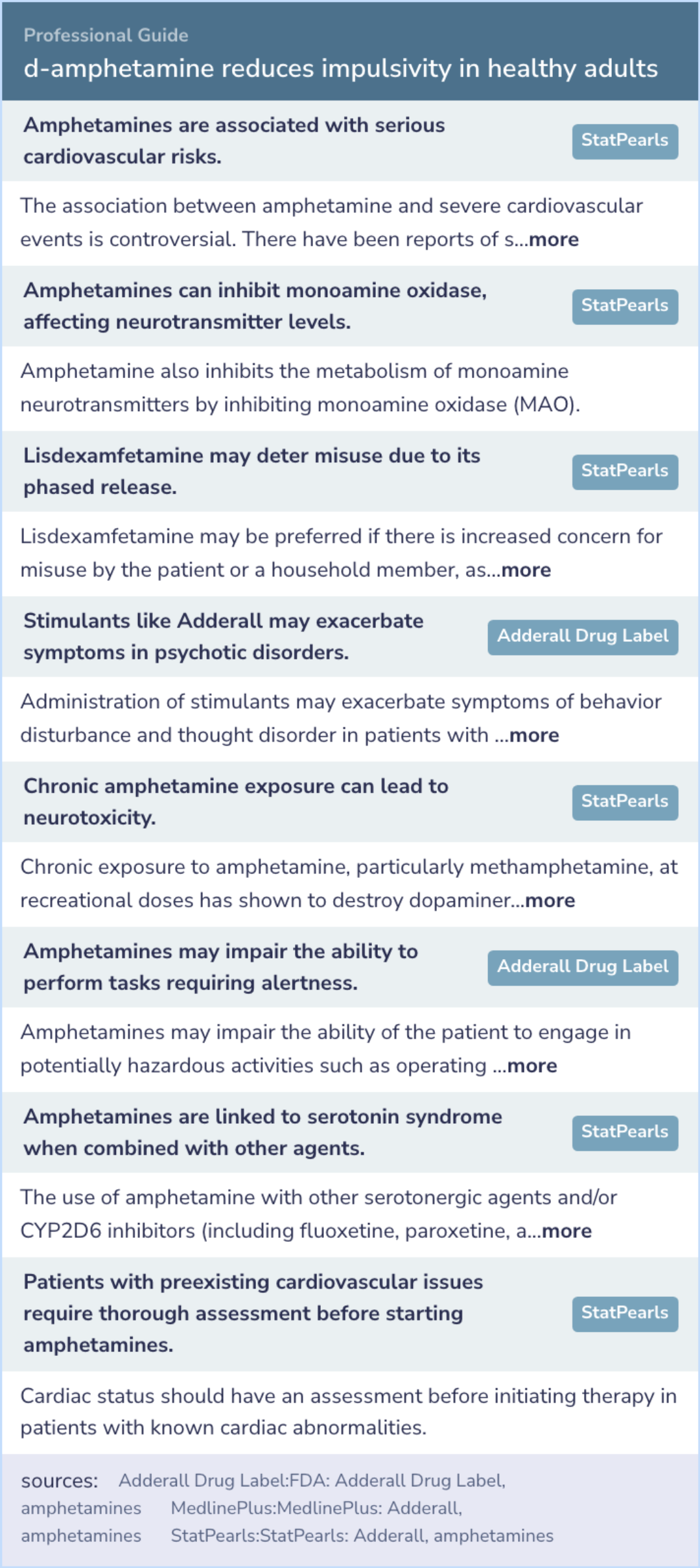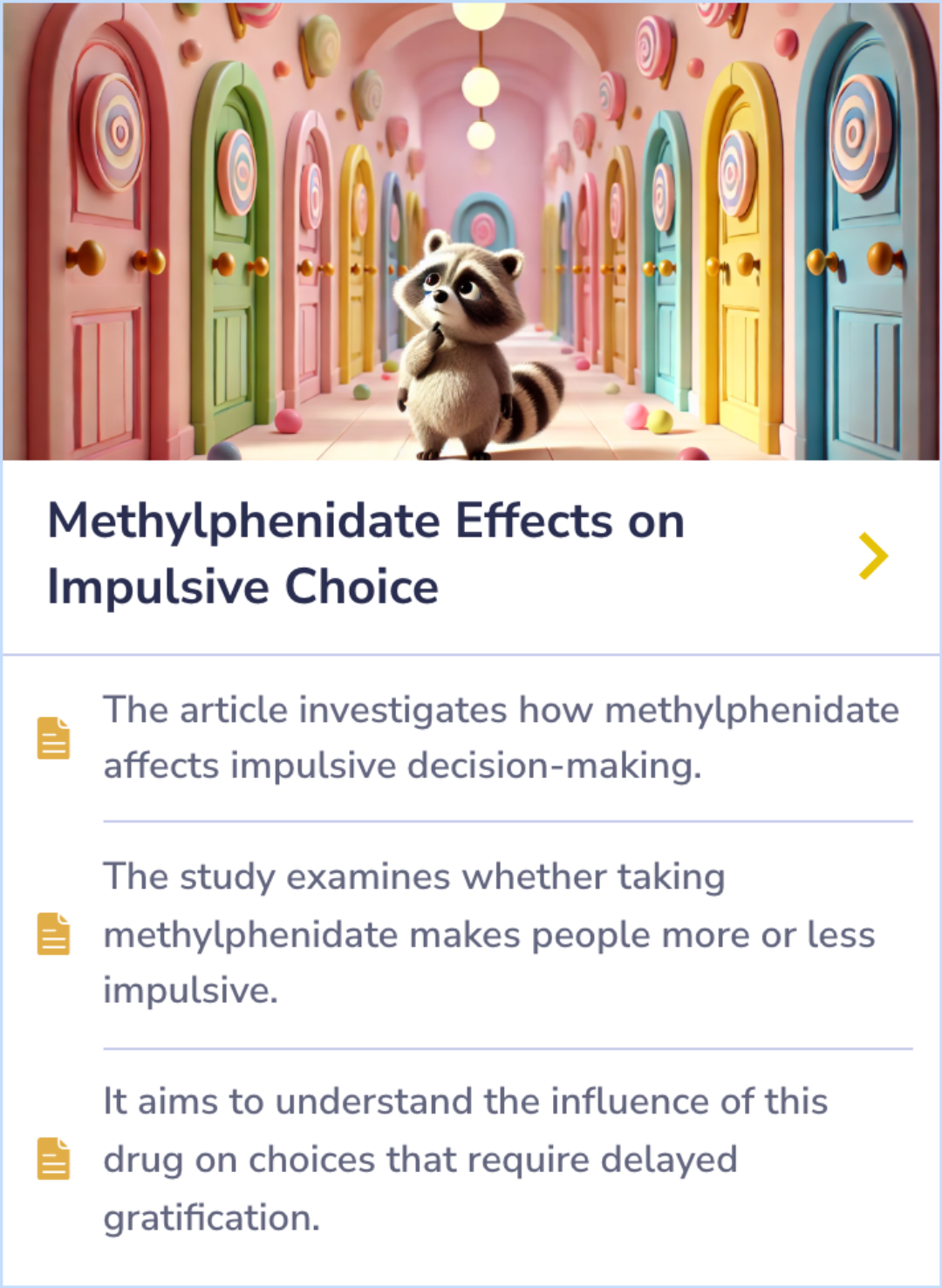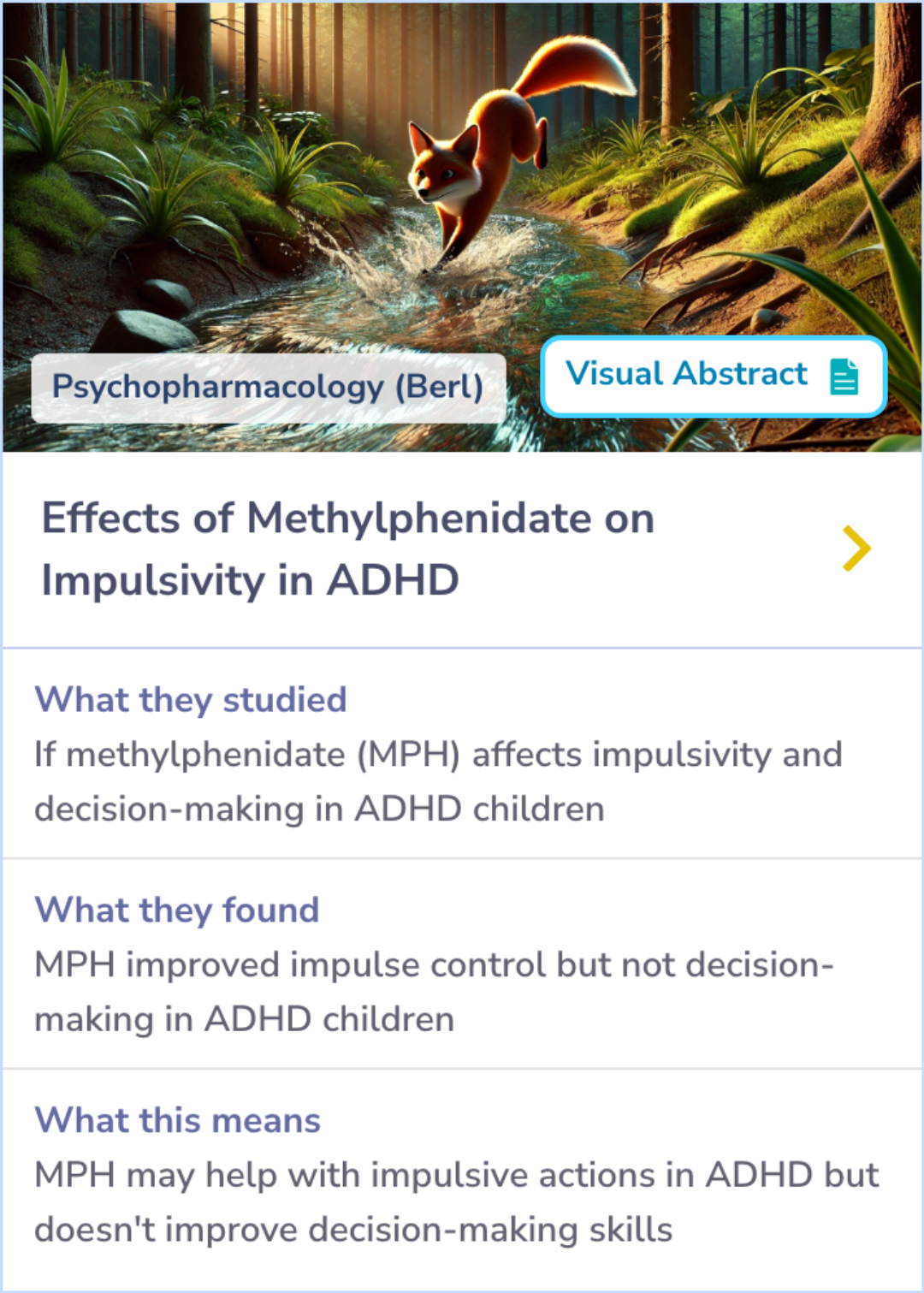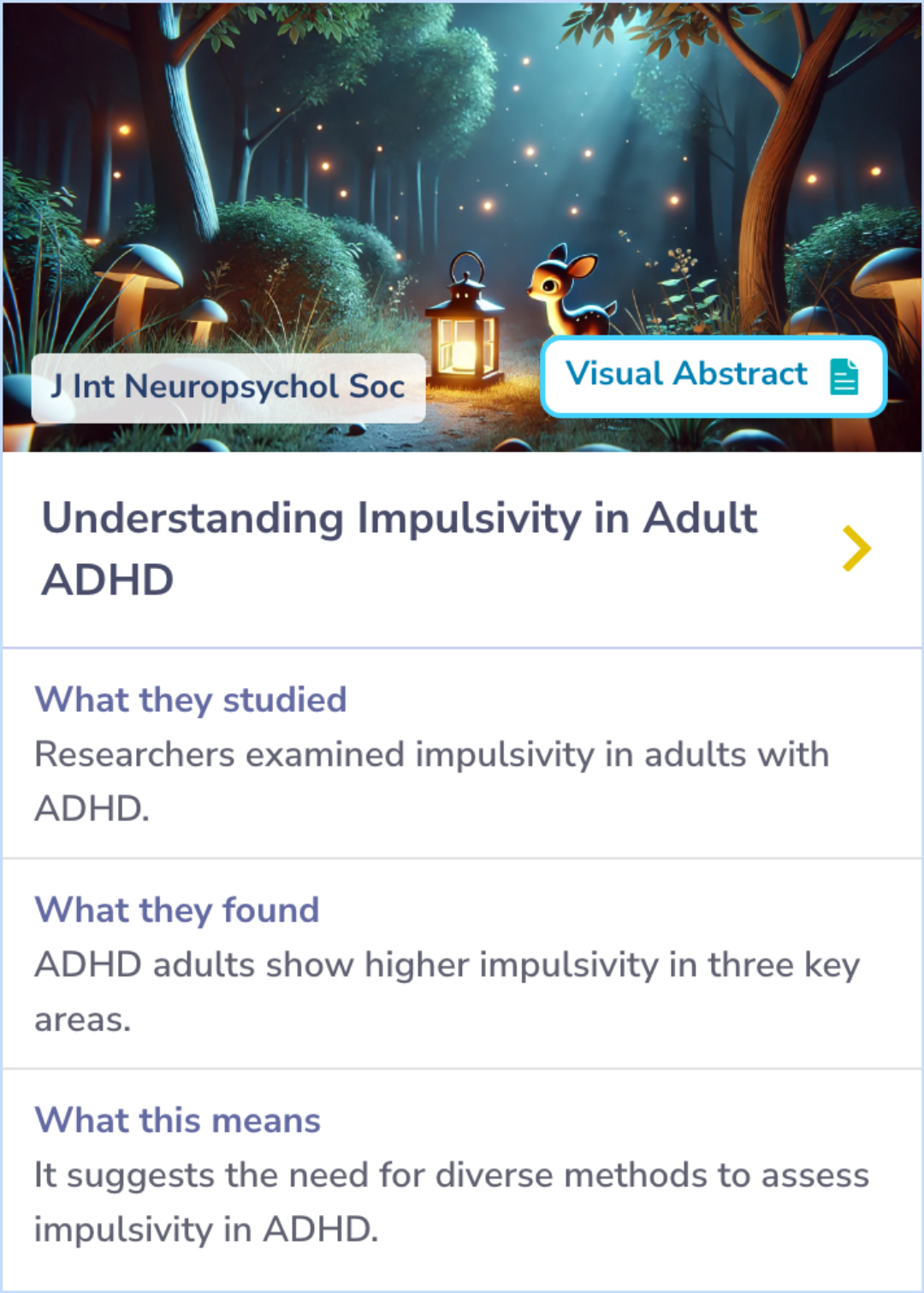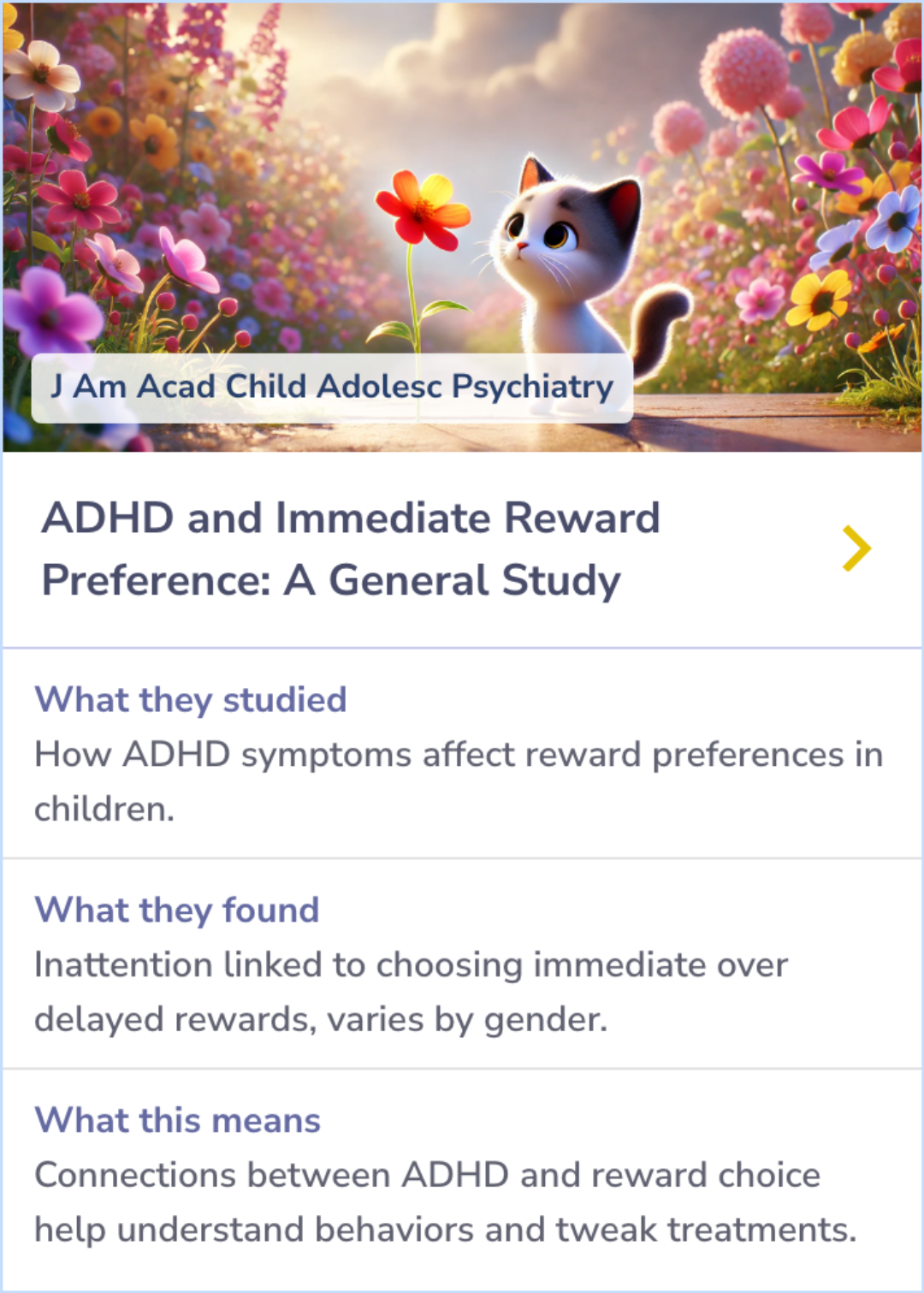Adderall Study Database
Visual Abstract
Acute administration of d-amphetamine decreases impulsivity in healthy volunteers
Amphetamine (Adderall) Decreases Impulsivity in Key Behavioral Measures
August 27, 2024
author
de Wit H, Enggasser JL, Richards JB
journal
Neuropsychopharmacology
Date Published
2002 Nov
Why link to a visual abstract?
What is a visual abstract?
Original
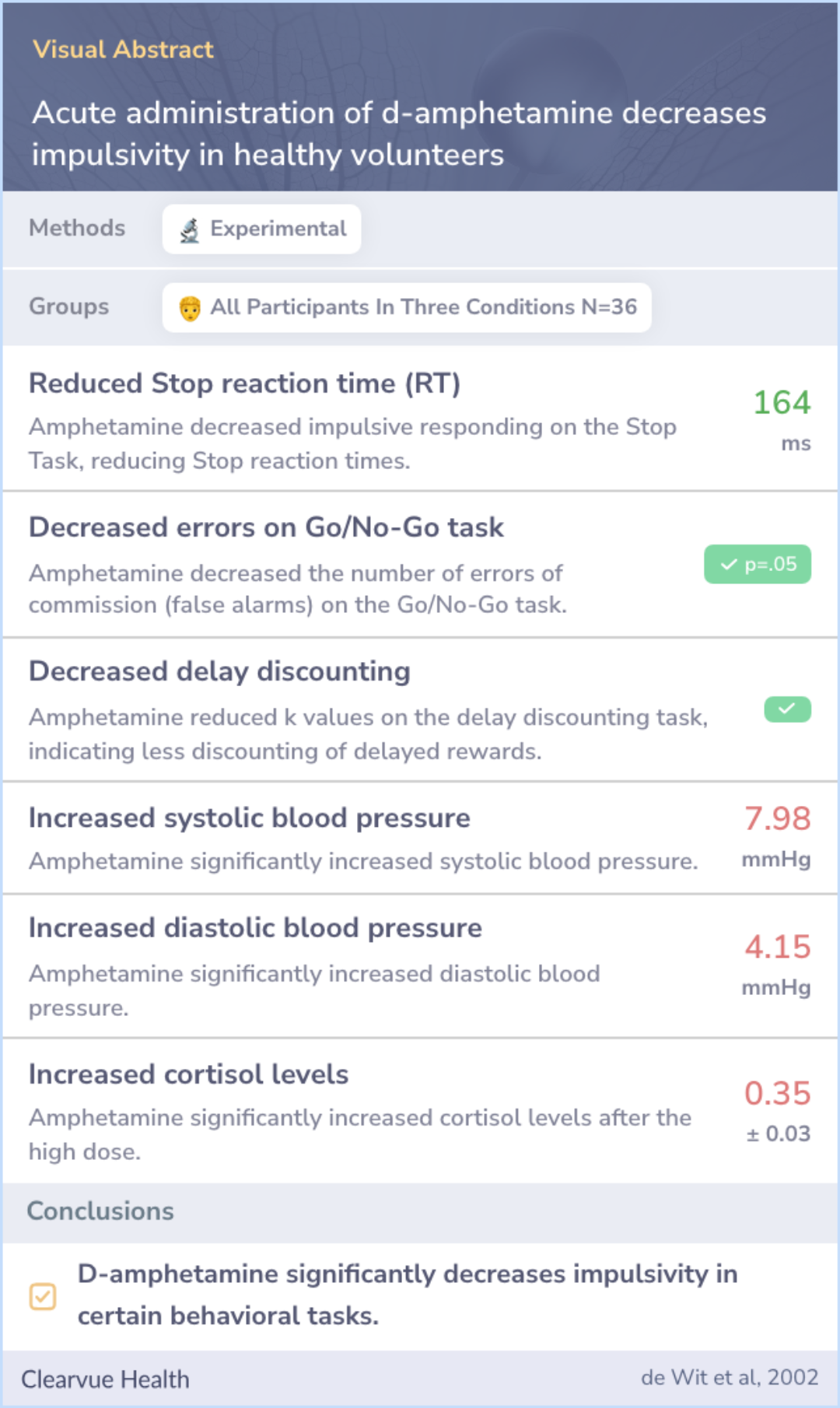
Study Summary
🔬
What They Studied
The study examined the acute effects of d-amphetamine on impulsivity, using multiple behavioral tests to measure changes.
💡
What They Found
D-amphetamine decreased impulsivity by producing less impulsive responses on several behavioral tasks.
📚
What This Means
The findings align with current evidence on Adderall's role in managing impulsivity, as it shows that d-amphetamine can reduce impulsive behavior, without affecting other impulsivity measures, consistent with its approved use in ADHD treatment.
Study Summary
Study Overview
In this study, low-to-moderate doses of d-amphetamine were linked to a decrease in impulsive behavior in healthy adults. The drug showed consistent effects on different measures of impulsivity, including behavioral inhibition and decision-making. Observations on the Go/No-Go task indicated fewer errors when d-amphetamine was administered. Although d-amphetamine appeared to reduce impulsiveness, its performance-enhancing qualities raise concerns about its potential for misuse. Understanding the relationship between dosage and behavior can help address issues related to drug dependency and impulsive actions.
This aligns with the current guidelines on the effects of stimulant medications.
This aligns with the current guidelines on the effects of stimulant medications.
Abstract: background
This study investigated the acute behavioral effects of d-amphetamine on several behavioral indices of impulsivity. Impulsivity has been defined, variously, as difficulty in inhibiting inappropriate behaviors, inability to wait, insensitivity to dela...more

Decreased Impulsivity
"In the present study, low-to-moderate doses of d-amphetamine decreased impulsive patterns of responding on three measures of impulsive behavior, two of which assess behavioral inhibition and one of which measures the relative value of immediate vs. delayed rewards."
Consistent Effects
"It is notable that the drug's effects were consistent on these very different measures of impulsive behavior: two measures of inhibition and a cognitive measure of choice and decision making."
Study Goal
"The main goal of this project was to investigate the effects of a single dose of a stimulant drug, d-amphetamine, on these behavioral measures of impulsivity in healthy human volunteers."
Study Summary
Methods
In this experiment, 36 healthy men and women took part in three separate sessions where they were randomly given either a placebo, 10 mg, or 20 mg of d-amphetamine (Adderall). During each session, participants completed five different tasks aimed at measuring various dimensions of impulsivity. These tasks included the Stop Task for behavioral inhibition, a delay discounting task to assess preference for immediate versus delayed rewards, a delay of gratification task, a Go/No-Go task, and a time estimation task. Each task was designed to measure specific behaviors related to impulsivity.
Additionally, participants filled out mood questionnaires to track the subjective effects of the drug, such as changes in mood and overall feelings of stimulation or euphoria.
Additionally, participants filled out mood questionnaires to track the subjective effects of the drug, such as changes in mood and overall feelings of stimulation or euphoria.
Abstract: methods
In this study, 36 healthy men and women participated in three sessions, in which they received placebo, 10 mg, or 20 mg d-amphetamine in randomized order. On each session they performed the following five tasks: the Stop Task, which measures behavior...more

Study Summary
Results
The use of Adderall produced several mood-related effects as expected, with participants reporting increased feelings of friendliness, elation, and euphoria. Importantly, on measures of impulsivity, Adderall reduced impulsive actions in three out of five tasks. For example, it improved participants' ability to inhibit responses in the Stop Task and reduced the number of errors in the Go/No-Go task. Additionally, at a 20 mg dose, Adderall decreased the tendency to prefer immediate rewards over delayed ones in the delay discounting task.
However, Adderall did not significantly affect impulsivity in the delay of gratification and time estimation tasks, suggesting its impact on impulsivity may be task-specific.
However, Adderall did not significantly affect impulsivity in the delay of gratification and time estimation tasks, suggesting its impact on impulsivity may be task-specific.
Abstract: results
Amphetamine produced its expected subjective, mood-altering effects, including increases in POMS Friendliness and Elation scales, and ARCI Euphoria and Stimulant scales. On the measures of impulsivity, amphetamine decreased impulsive responding on th...more
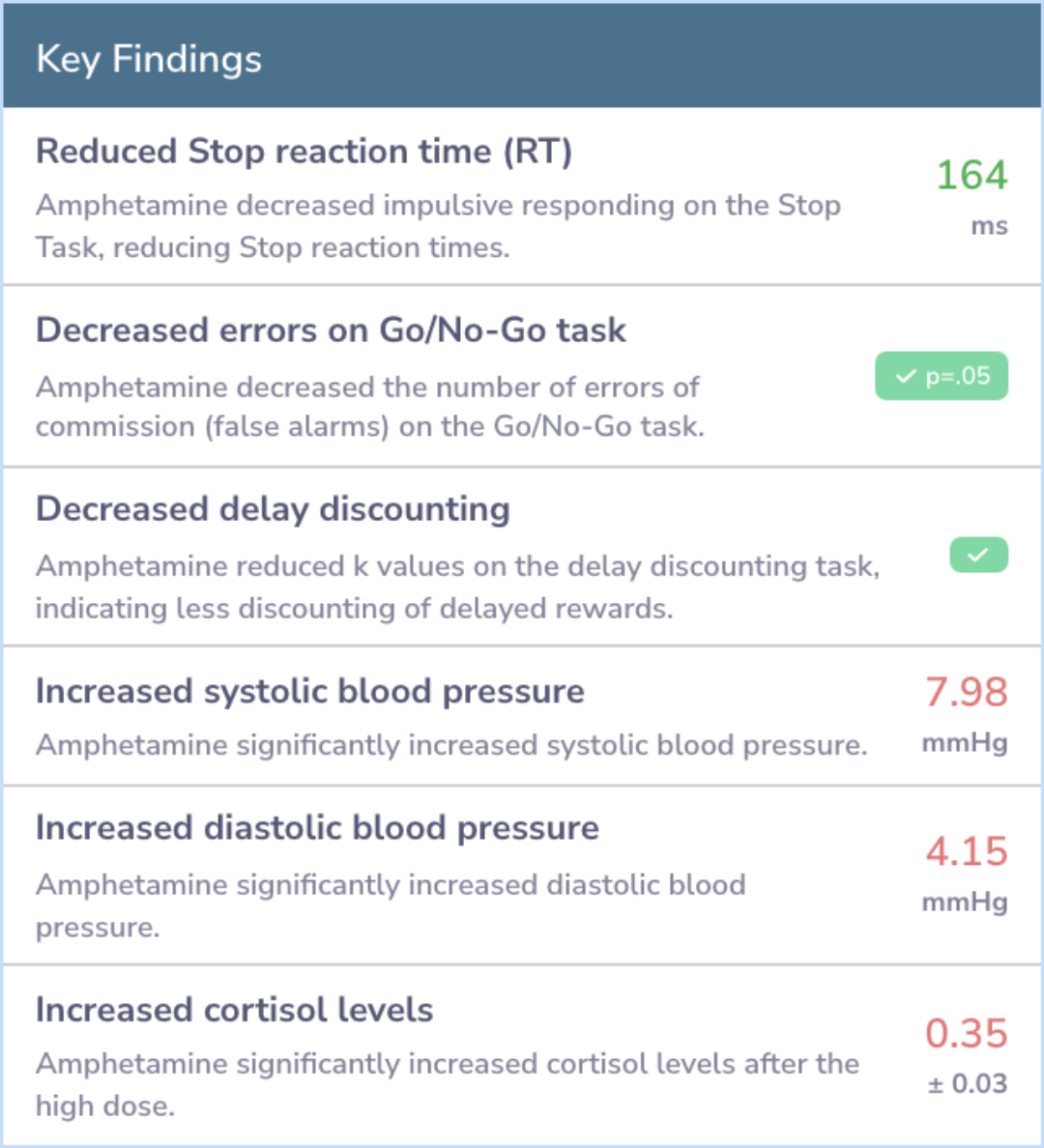
Study Summary
Conclusions
The findings from this study indicate that Adderall, at certain doses, can reduce various forms of impulsive behavior in healthy adults. These results reinforce and expand upon earlier research conducted in both humans and animal models. The study highlights that while Adderall can effectively decrease impulsivity in some contexts, its effects are not universal across all tasks measuring impulsive behavior.
This research adds valuable insights into how Adderall may be used to manage impulsivity, particularly in contexts where control over immediate reactions and reward preferences is critical.
This research adds valuable insights into how Adderall may be used to manage impulsivity, particularly in contexts where control over immediate reactions and reward preferences is critical.
Abstract: conclusions
These results suggest that acute doses of amphetamine decrease several forms of impulsive behavior. These findings extend and confirm previous findings in humans and laboratory animals.
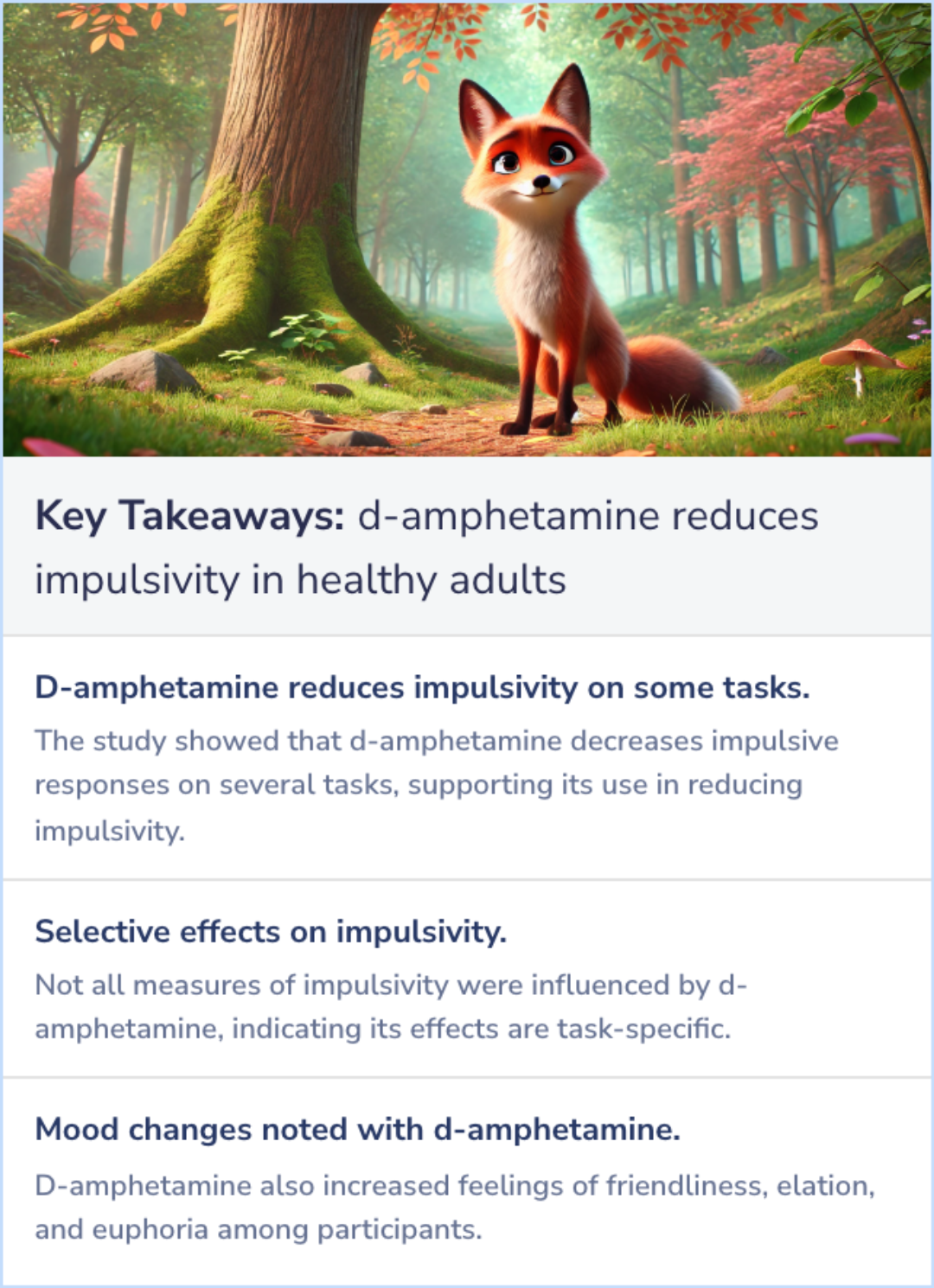
Background Information
Patient Guide
💊
Adderall's Mechanism in ADHD
Adderall increases dopamine and norepinephrine levels, reducing impulsivity in ADHD treatment.
💉
Dosage Variability
Adderall dosing varies from 5 mg to 40 mg; adjustments depend on therapeutic needs and response.
😃
Mood-Altering Effects
Amphetamines, including Adderall, produce mood-altering effects noted in questionnaires.
🔍
Monitoring Growth and Abuse
Regular monitoring for growth suppression and abuse potential is required in amphetamine use.
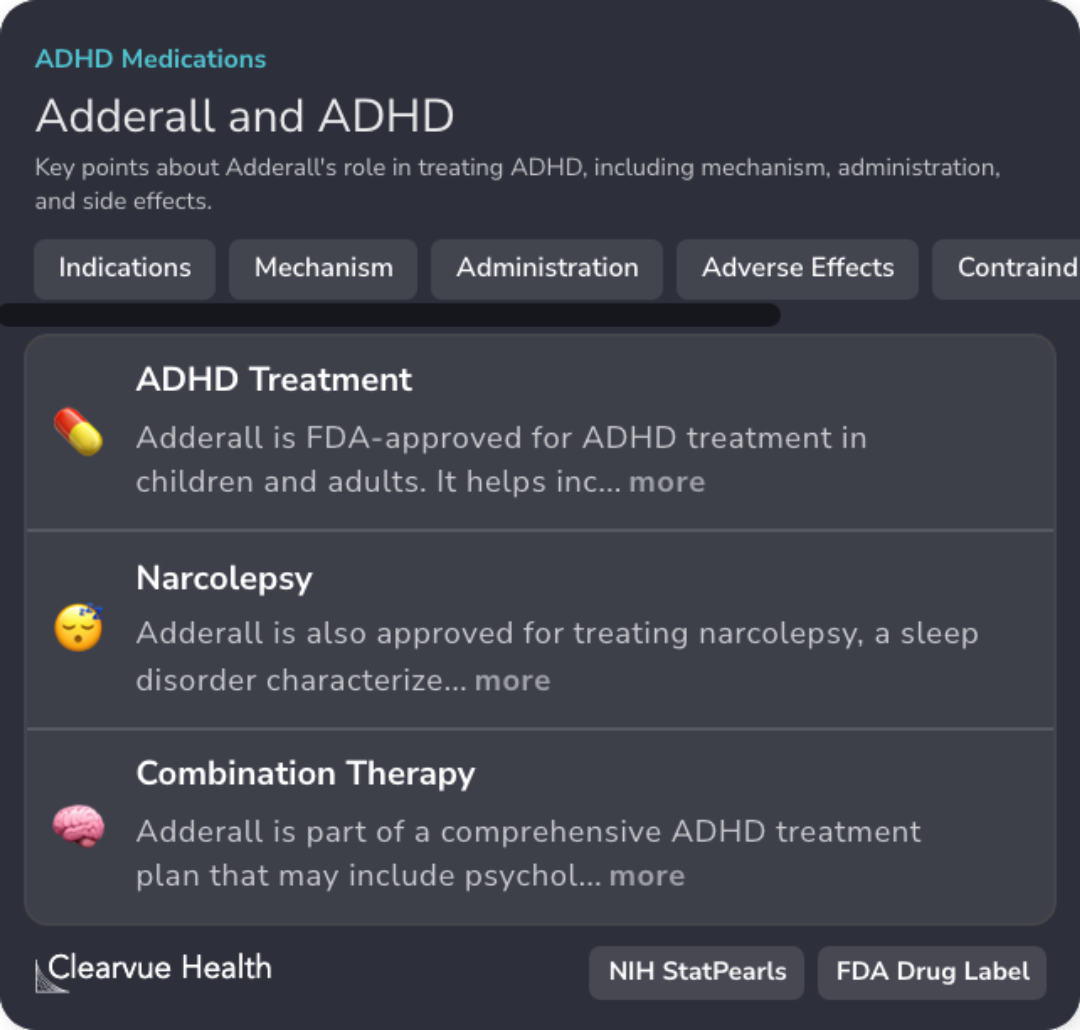
Professional Guide
Expert Opinion: d-amphetamine reduces impulsivity in healthy adults
In line with the study's findings that highlight the behavioral effects of amphetamines, current clinical guidelines emphasize careful consideration when prescribing these medications. Amphetamines are linked with severe cardiovascular risks, necessitating thorough cardiac assessments before starting treatment, particularly for those with preexisting cardiovascular issues.
Notably, while they may reduce impulsivity, amphetamines can exacerbate symptoms in patients with psychotic disorders.
Chronic use may lead to neurotoxicity and impair alertness, raising concerns about tasks requiring operational safety.
Additionally, amphetamine's ability to inhibit monoamine oxidase highlights its complex interaction with neurotransmitter systems.
Furthermore, the risk of serotonin syndrome when combined with serotonergic agents underscores the importance of cautious use alongside other medications.
Notably, while they may reduce impulsivity, amphetamines can exacerbate symptoms in patients with psychotic disorders.
Chronic use may lead to neurotoxicity and impair alertness, raising concerns about tasks requiring operational safety.
Additionally, amphetamine's ability to inhibit monoamine oxidase highlights its complex interaction with neurotransmitter systems.
Furthermore, the risk of serotonin syndrome when combined with serotonergic agents underscores the importance of cautious use alongside other medications.
Evidence Summary
Methylphenidate's Role in Shaping Impulsive Decisions
The article delves into how methylphenidate affects impulsive decision-making. Focusing on whether this drug influences impulsiveness, the study examines choices that involve delay and reward dynamics. Specifically, it seeks to determine if methylphenidate alters tendencies towards decisions requiring delayed gratification.
While the abstract focused on d-amphetamine's impact, here the attention shifts to understanding another drug's influence on impulsivity patterns.
While the abstract focused on d-amphetamine's impact, here the attention shifts to understanding another drug's influence on impulsivity patterns.
Evidence Summary
Varying Impacts of ADHD Medication on Impulsivity
Impulsivity, a key factor in ADHD, manifests in various ways, affecting cognition and behavior. Research explored the effects of medication on impulsivity, specifically methylphenidate in boys with ADHD. This medication improved impulse control, yet interestingly did not enhance decision-making or alter reflection impulsivity.
Despite gathering the same information, ADHD participants often made poorer decisions than their unaffected counterparts. The complexity of impulsivity means some aspects improve with treatment, while others persist.
Despite gathering the same information, ADHD participants often made poorer decisions than their unaffected counterparts. The complexity of impulsivity means some aspects improve with treatment, while others persist.
Evidence Summary
Exploring Impulsivity in ADHD Adults: Cognitive, Motor, and Attentional Perspectives
Impulsivity presents significant challenges for adults with ADHD, affecting cognitive, motor, and attentional dimensions. Researchers explored these impulsivity traits using self-reports and tasks like the Barratt Impulsivity Scale, Continuous Performance Task, and Iowa Gambling Task. The ADHD group exhibited heightened impulsivity and struggled with task performance, indicating deficits in impulse control mechanisms. This approach underscores the value of combining self-assessment with neuropsychological tasks.
Evidence Summary
Unpacking Delay Aversion and ADHD Connections
Delay aversion describes a stronger inclination to choose smaller immediate rewards over larger delayed ones, capturing the essence of choice impulsivity linked to ADHD. When children chose between immediate or delayed rewards, those with inattention symptoms favored the immediate option, consistently across boys and girls. In boys, an added dimension of delay aversion was noted, while hyperactivity-related impulsivity influenced results only in girls under certain conditions.
